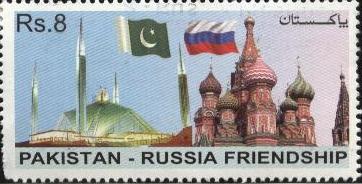
Former Indian Prime Minister Indira Gandhi once said, “Nations are guided only by their own interests and have no obligation to other countries which did not conform to those interests.” For this reason, India seems flustered about the forward movement in Pakistan-Russia relations. There have been various developments of note recently. In June last year, Russia lifted an embargo on weapon sales to Pakistan, and this August, the two signed a minor defense deal for the sale of four Mi-35 Hind attack helicopters to Pakistan. Most importantly, last month, Pakistan and Russia signed a $2 billion energy deal for the first time in three decades, for the construction of a pipeline to transport liquefied natural gas (LNG) from Karachi to Lahore. Additionally, the recent high-profile visits, including Pakistan Army chief General Raheel Sharif’s three-day visit to Moscow, have given new impetus to bilateral ties. Both countries appear to be likeminded regarding normalizing the region, particularly Afghanistan, and Moscow is also facilitating Islamabad’s and New Delhi’s membership of the Shanghai Cooperation Organization.
Pakistan-Russia relations have been marred by historical missteps. During the Cold War, Pakistan’s inclination towards the capitalist block led by the United States, and New Delhi’s friendship with Moscow, were limiting factors. India successfully alienated Pakistan from Russia, and also kept ties with the United States. As a result, India received military as well as economic aid from both eastern and western blocks. India is the largest recipient of Russian military equipment, but interestingly, it is the biggest recipient of U.S.economic assistance over the 66-year period from 1946 to 2012, according to a report published by USAID. According to the report, India received almost $65.1 billion (inflation suggested) in economic assistance during this period, with a large part of it coming in the early 50s, 60s, and early 70s. With regard to military assistance, the report put India at 47 out of 193 countries, receiving $897 million in the same 66-year period.
The wobbly Pakistan-Russia ties added to the mutual mistrust. Pakistan’s alignment with the western block, Soviet invasion of Afghanistan, and Russia’s Indo-centric approach defined a complicated relationship throughout the Cold War era. Ironically, there is not a single bilateral dispute between these countries. However, the decades-old frost is gradually melting. The evolving regional and global security environment offers a number of opportunities. Asia can be the ground for mutually beneficial cooperation for these nations, especially in areas such as energy, counterterrorism, trade, and education.
Pakistan seeks direct Russian investment and technological cooperation, particularly in the nuclear energy sector. Moscow’s state-owned nuclear energy company Rosatom has a significant international presence, and energy deficient Pakistan can be a particularly beneficial business opportunity, with possibility of long term gains. The Carnegie Moscow Center’s Peter Topychkanov has highlighted the importance of Russo-Pakistani nuclear cooperation. Currently, nuclear energy contributes only 3 percent to the total energy mix of Pakistan. Russian assistance in civilian nuclear energy will enable Pakistan to overcome its massive power deficit.
In the fight against terrorism, Pakistan has incurred a total loss of $107 billion in the last 14 years. It is estimated that more than 50,000 people including army, police, and civilians have lost their lives. Russia’s decision to go ahead with the sale of Mi-35 attack helicopters to Pakistan is significant because it will increase the military’s firepower and mobility, and will assist in the fight against militancy. In addition, in November 2014, Pakistan and Russia signed a bilateral military cooperation agreement, specifically mentioning counterterrorism as an area they will work together on. Though the specifics of this agreement are not yet in the public domain, there is a possibility that Pakistan would find this cooperation beneficial in dealing with terrorist threats emanating from the western border, and eliminating safe havens. In addition, counternarcotics will be a key feature of this cooperation in order to curb drug trafficking from Afghanistan.
There is also great potential for economic activity. If Russia invests in the China-Pakistan Economic Corridor, this move will be instrumental in bringing about economic interdependency, ultimately transforming the Russia-China-Pakistan relationship into a strategic triangle. American efforts to contain China’s rise and Russian resurgence are driving the three closer, at least momentarily. Russia can be a strong regional partner for Pakistan. According to 2015 figures, Russia has the sixth largest economy in terms of purchasing power parity, and according to 2010 figures, it is the third major holder of foreign reserves in the Asia Pacific region. Russian investment in Pakistan will be a win-win for both.
People-to-people contact in the era of globalization is equally important in strengthening bilateral relations. According to Zaheer Janjua, Pakistan’s Ambassador to Russia, Islamabad and Moscow are working on the first ever year of cultural exchange, to augment “multidimensional” ties between the two countries. Cultural exchanges and frequent public interactions will help reduce misperceptions. In the field of education, Pakistan can get enormous benefits from the Russian education system, since Russia has contributed immensely towards the development of science, engineering, and information technology. Student exchanges between Pakistani and Russian universities will offer multiple opportunities for scholars and intellectuals.
Throughout history, Pakistan-Russia relations have been a tale of lost opportunities. There is an unexplored potential in this nascent relationship. Meaningful bilateral cooperation would be of paramount importance, particularly for the long-lasting peace in this terror-hit region. The strategic landscape has dramatically changed since the Cold War, and we are in an era of new alliances. Russo-Pakistani cooperation, based on working together in multiple sectors including energy, defense, economy and education, is the need of hour. This relationship will not only focus on curbing terrorism, but also explore further avenues of mutual importance to both countries.
***
Image: Pakistani Post


